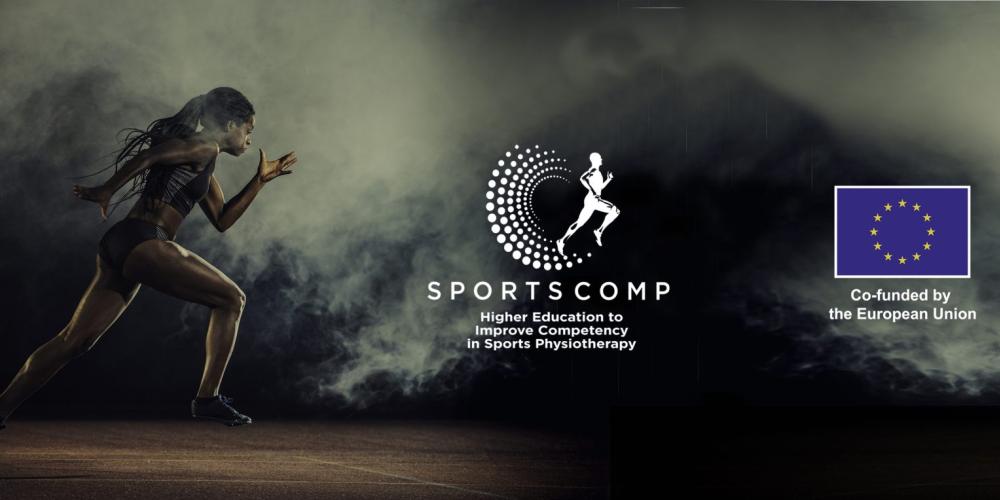
In 2023, the Erasmus+ project SportsComp received approval and €400,000 in funding from the European Commission. The project’s aim is to update the competencies of sports physiotherapists to meet the changing role of the profession worldwide, and then bring this out into the field through higher education. The coordinator of the project is Jamk University of Applied Sciences (Finland); our colleagues from VUB’s Human Physiology and Sports Physiotherapy (MFYS) research group are a partner, and are running point on one of the WP, which rounded off its main body of work this spring.
The project brings together five partners: the University of Tartu (UT, Estonia), the University of Thessaly (UTH, Greece), Jamk University of Applied Sciences (Finland), the International Federation of Sports Physical Therapy (IFSPT, based in Switzerland), and VUB’s MFYS research group.
The Competencies & Standards document
2004 was when the original work was done to collate the necessary competencies for sports physiotherapists. The IFSPT collected information from its member organisations on guidelines related to clinical practice, standards, post-graduate information, etc. This was compiled between February and May 2004, followed by a content analysis and 2-day meeting, and eventually the final document with standards and behaviours was approved at the IFSPT’s meeting in Norway in 2005.
In all, 11 competences of a sports physiotherapist were identified, each covering: behaviours, foundational knowledge, critique and synthesis, information collection, information processing, action/intervention, and evaluation and modification. It includes all aspects of injury prevention, acute injury intervention and taking immediate action, as well as, rehab, promoting safe and active lifestyles and of course, life-long learning and training.
Just short of 20 years later, this document is getting an update, and will again be brought to sports physios in the field through higher education.
As with all Erasmus+ projects, this one also consists of several work packages (WPs), which include one on general project management (WP1), and one on communications and dissemination (WP5), so we’ll take a closer look at WP 2, and a wee look ahead to the work of WPs 3 and 4.
WP2: updating the competencies and standards document
WP2 is led by VUB Professor Jo Verschueren and Professor Bruno Tassignon, with support from Research Assistant Emilie Dick. The outcomes from WP2 will form the base for the work of WPs 3 and 4 and has at its core a Delphi survey. A Delphi study is a qualitative research method to collect data from respondents within their domain of expertise. In the case of SportsComp, input was sought from all 40 global member organisations of IFSPT to ensure wide geographical coverage. Three focus groups and 8 stakeholder interviews were held as well to complement the survey. The work started in November 2023 and crossed the finish line in April-May 2024 after several rounds of intense data gathering, discussions and interviews. The consortium’s April meeting at the VUB in Brussels had as its main objectives to reach a consensus on the updated and new competencies, as well as updates on the other WPs’ progress.
Bruno Tassignon: “We were very impressed in the feedback we received, as some 146 sports physiotherapists from across the world responded to the survey. The new standards document includes some new aspects. For instance, more gender-neutral wording; a focus on staying up to date on innovation and keeping abreast of technological developments; the notion of fair play is still included but has been moved under the wider banner of ‘ethics and cultural competence’. From a content-specific point of view, one example of an update is for instance the term ‘recovery’, which in the 2005 version was mentioned in terms of post-match training and in a rehab setting. Now, it also features in injury prevention for instance, so overall we looked at things from a more holistic perspective.”
Not just sports physiotherapists were consulted in the process. The focus groups consisted of three segments. In all some 6-9 people were included in each segment with athletes making up the first one. The other segments were support personnel (such as psychologists and doctors who are active in sports organisations) and organisations, so people active in sporting federations. The different perspectives were important here. “All were asked e.g. ‘what do you expect from a sports physio’, and athletes would stress the trust element, whereas representatives from sporting federations would put a focus on good reporting and communication” Bruno explains.
The stakeholder interviews were with representatives from regional Olympic and Paralympic committees, and international organisations like WHO, FIFA, etc. It was important to gather up a mix of feedback from different competency areas, different levels of athletes (recreational ones to professional Olympians), and community healthcare environments.
Consensus was reached on the final standards in April, and this document will now be used by WPs 3 and 4, where the focus is on developing e-learning courses, teaching materials, and implementing these worldwide.

E-learning courses based on updated standards.
WP3 will take the updated competencies and standards document and develop three e-learning courses to ensure sports physios get the necessary continuous learning and development within the European Qualifications Framework (EQF) level 7. It means that WP3, led by UTH, will also develop educational materials and innovative teaching methods focussing on digitalisation and hybrid learning.
Afterwards, WP4 will take the lead in implementing the e-courses and adjusting them based on feedback after the initial piloting phase. At the end of this process, WP4 will develop and publish a tutor guide to ensure that the updated competencies and standards are in line with the set-out contents of the courses.
The courses eventually will be proposed to students, academics and professionals as part of life-long learning and further development programmes.
More information on SportsComp:
- SportsComp Website
- VUB MFYS research group website
- VUB contact: Professor Jo Verschueren (jo.verschueren@vub.be) and Professor Bruno Tassignon (bruno.tassignon@vub.be)